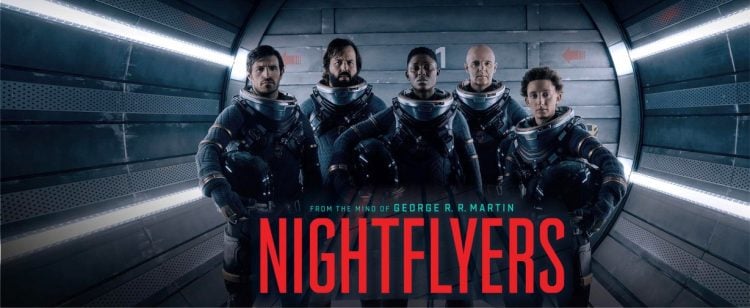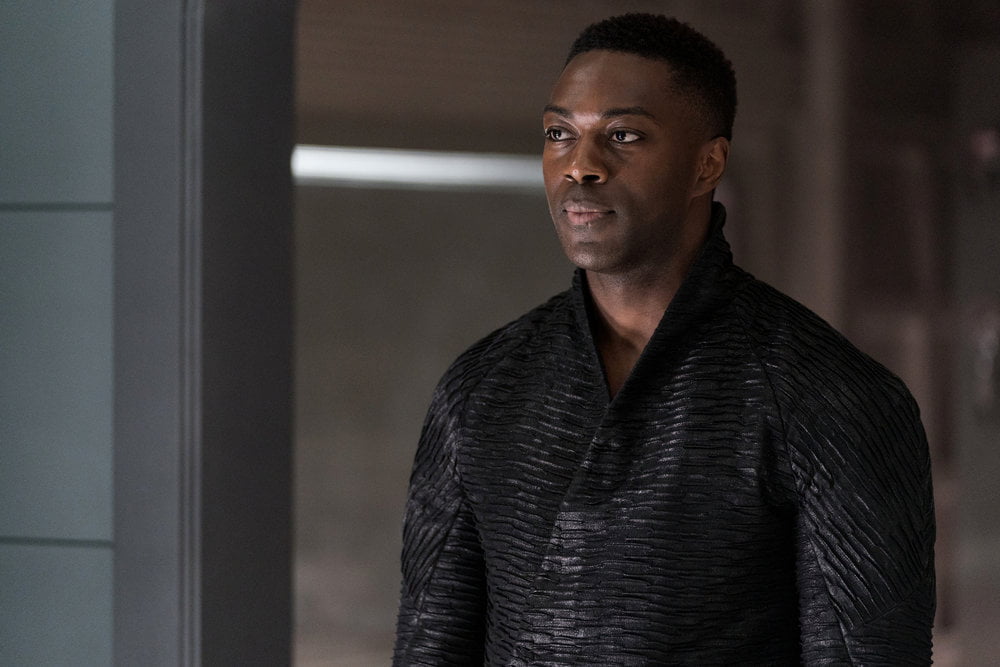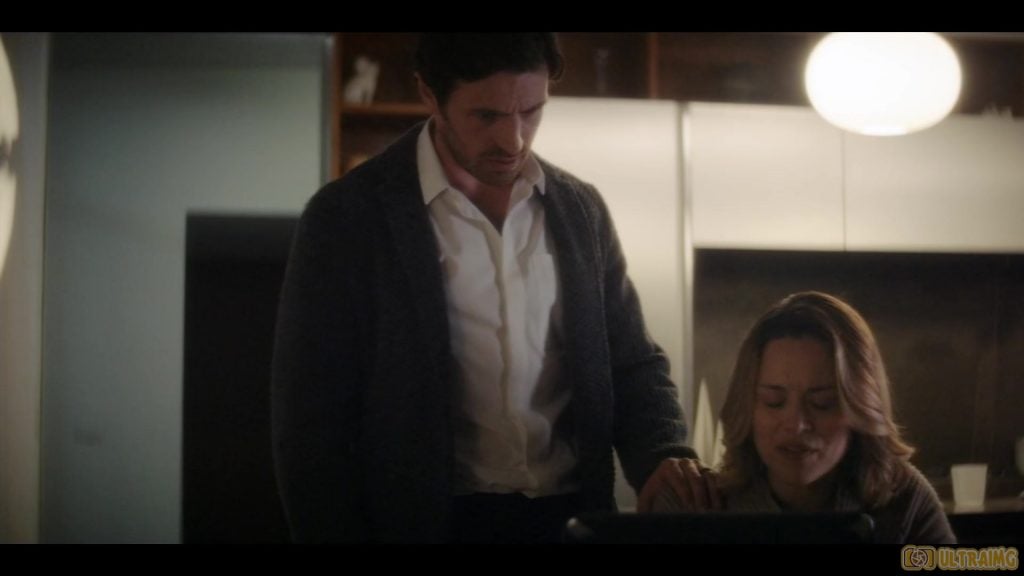
“Any that intelligent would see the human race for what we are. We’re a virus that has killed its host and is looking for a new host to infect.”
Though ‘Game of Thrones‘ fans still have six months yet before the final season premieres, this week another George R.R. Martin property makes its small screen debut. Based on the 1980 novella of the same name, ‘Nightflyers‘ is a maxi-series that follows a team of scientists, led by Dr. Karl D’Branin as they attempt to contact the Volcryn, an alien race who may have the answers to save a dying Earth.

One of the more difficult tasks of a new series is capturing the audience’s attention early on. Almost every successful show has done this—along with telling consistently good stories, of course—and it’s fair to say that ‘Nightflyers’ pulls it off in spades. Taking the in media res approach, viewers are dropped into the chaotic atmosphere of the ‘Nightflyer’ as Dr. Agatha Matheson frantically tries to warn anyone who finds the ship not to bring it back to Earth. She staves off an attack from what we soon discover to be Rowan, the expedition’s xenobiologist. The episode then pulls off the biggest of shocks; not the Jack Torrance-like Rowan killing Agatha or her killing him…instead, Agatha takes a surgical saw to her own throat and viewers are left with mouths agape asking, ‘what the hell just happened’.
As good as those first few minutes are, the remaining 58 minutes are an uneven affair.

The introductions to the primary science team who, in addition to Matheson and Rowan, consist of Lommie Thorne (resident tech expert), Melantha Jhirl (mission specialist), and Karl D’Branin (team lead) offer nothing memorable or truly special. There isn’t much backstory given to the players, save for a handful of peeks into Karl’s past, the wife he left and the daughter he lost. The personalities of the others seem to be taken from a story writing template—Mel’s a genetically modified human, engineered specifically for space travel and brimming with the confidence that she’s the most capable person in any room. Lommie is an anti-social type, uncomfortable interacting with humans but exceptional in directly linking with machines. Rowan is the cynic of the group, speaking out on multiple occasions regarding the futility of their mission. Not a part of Karl’s team is the ‘Nightflyer’ captain, Roy Eris, an enigma shrouded behind his own private story. Appearing only as a hologram, he maintains physical isolation from his crew and passengers alike, though he sees and hears everything that occurs on his ship. Finally, there is Dr. Agatha Matheson. It’s obvious that she and Karl have a history but it’s her abilities as a psychiatrist and relationship with Thale, an extremely powerful telepath and the most interesting character in the episode, that is more intriguing.

Though not much is given as to the history of telepathy in 2093, telepaths are looked upon as vile abominations, evil and murderous. Other than Agatha, no one on the ship is comfortable with Thale’s presence. He doesn’t make things easier for himself, psychically lashing out at others though Agatha frames it as a defense mechanism. Thale’s a cheeky bugger who’s rude and inappropriate remarks are the trademark trope of the person who hides his pain behind aggressive barbs and taunts. Still, Sam Strike’s performance is strong and yet he provides us the tiniest glimpse of vulnerability. Framed as the antagonist from the start, it’s obvious that there’s something more sinister going on and despite the crew’s fears, Thale’s the least of their worries.
From a tonal standpoint, ‘Nightflyers’ is strong on the psychological horror. Throughout the episode, the ominous nature of this expedition is written clearly in every musical note, not to mention the personal mishaps the main characters experience. Taking place aboard a starship attempting to contact an alien lifeform, it would be easy to assume that ‘Nightflyers’ is science-fiction to the core. But it is so much more than that, taking on similar tonal cues as 1997’s ‘Event Horizon’ or the ‘Alien’ franchise, both of which married those sci-fi elements with that portentous dreads of horror. It’s this template that makes ‘Nightflyers’ unique but also could be a stumbling block.
“All That We Left Behind” contains the seeds of excellent television but the overuse of character tropes and, at times, sliding past subtlety when establishing the tension of what’s behind the curtain. It’s not bad by any stretch but the premiere suffers the same fate as many first episodes—overstuffed with world-building that, while necessary, loses some of its coherence thus muddling the narrative. Even in that, the pieces are there to create a unique experience, so long as the story narrows its focus more on Karl’s team (and Roy Eris) instead of the ‘Nightflyer’ crew who, let’s be honest, is there as nothing more than cannon fodder.
Into the Void
- It’s always a difficult task for a television series premiere to be without its faults. When the series is being adapted from a book, it can make things even more difficult. For fans of the novella, the differences between Martin’s original work and the television series is evident. There are pieces of the novella sprinkled in but this will be a much different experience than the book. This isn’t necessarily a bad thing but fans of the original may need to take a step back and appreciate the television effort as its own thing…so long as the series succeeds in telling a compelling story.
- On the flipside of the somewhat muddled nature of the episode, there were some potential diamonds for the remainder of the series. The Luna-71 line hints that telepaths can be an ornery group of individuals. Karl’s pain behind his daughter’s death was touched on but Eoin Macken never truly captured the emotion, though if that was a purposeful choice for this early on or Macken just not hitting that note remains to be seen.
- Though there wasn’t one character that I was able to really get attached to and despite Thale being the most interesting personality in the first hour of the series, Jodie Turner-Smith’s Melantha Jhirl may end up being the most compelling by day’s end. She brandishes her genetic superiority in a subtle way, not quite looking down upon her colleagues but that air is still there. Her reaction to her near-death experience at first seems genuine shock but when she and Lommie become intimate, there’s a calculating nature on her actions as Mel’s eyes are on Roy Eris the entire time, knowing that he’s watching.
![]()
